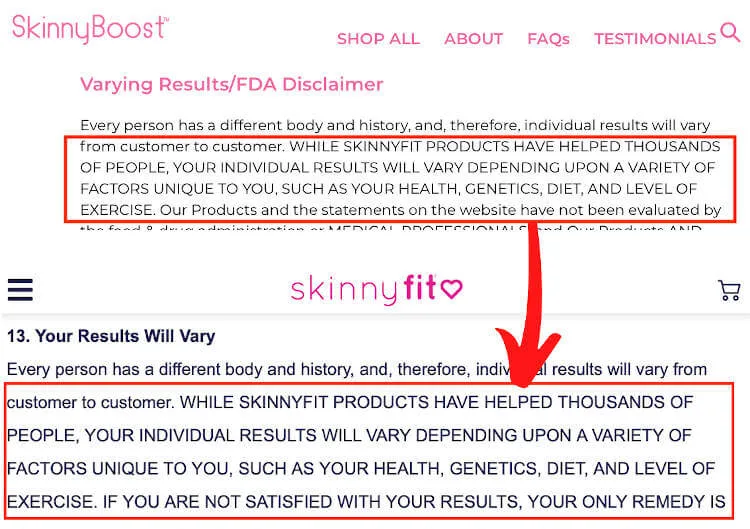What is Skinny Boost detox tea?
Skinny Boost detox tea is marketed with claims that it can “get rid of toxins, boost metabolism, increase energy, suppress appetite, reduce bloating, improve digestion, and help you lose weight.”
But what exactly is Skinny Boost tea? Can it really deliver on these claims? Is it safe? Are there any side effects?
What ingredients are in it? And, most importantly, does it work? Can Skinny Boost really “detox” you, help you fight fat, and reduce bloating?
In this review, I dig into the product’s ingredients and carefully evaluate the marketing claims against what is physiologically plausible and what you can reasonably expect.
If you’re determined to try out a detox tea, then please read this entire article to ensure your safety and well-being.
Other detox reviews on this site
Interactive health tools
Disclaimer: No conflicts of interest. This review is 100% independent and has no affiliate links. Ads that may appear on this site are autogenerated based on your individual Google search and browsing habits and I do NOT have direct control over them. Any revenue generated from ads offset website costs which keep these articles free, unbiased, and independent for you to read.
Skinny Boost ingredients
Skinny Boost has a morning and evening tea with similar but slightly different ingredients. For purposes of simplicity, I have combined them into one list. In the image below, you can see which tea contains which ingredients.

Green tea
Green tea contains a small amount of caffeine which might give you a feeling of alertness and help suppress appetite.
Oolong tea
Oolong tea contains caffeine which might make you feel more alert. It may also exert a mild diuretic effect.
Orange peel
Orange peel contains health promoting vitamins and phytonutrients.
Ginseng root
Ginseng is known to have a number of health-promoting effects, including improved blood sugar control, mood, and brain function.
Different types of ginseng have different effects, but it’s not known what type is used in Skinny Boost.
Garcinia cambogia
Garcinia Cambogia, also known as the Malabar tamarind, contains hydroxycitric acid, or HCA and may help regulate appetite and contribute to weight control.
Senna leaf
Senna‘s active constituents are called sennosides which stimulate the bowel and causes a laxative effect.
Peppermint leaf
Peppermint leaves may be helpful for digestive problems such as heartburn, nausea, and irritable bowel syndrome.
Depending on the dose, it could have a laxative effect on the body.
Fennel fruit
Fennel is used by mouth for various digestive problems including heartburn, intestinal gas, bloating, loss of appetite, and colic in infants among othes.
Cinnamon bark
Cinnamon bark may be helpful for soothing irritable bowel syndrome, diarrhoea, and bloating.
There is inconclusive evidence on its effects on appetite, with some research showing it can increase appetite and other reports showing the opposite.
Ginger root
Ginger may exert a laxative effect on the body by stimulating the bowels and may be useful for upset stomach, gas, and diarrhoea. It may also promote fluid loss as a diuretic.
Ginger might also stimulate appetite which may counter other ingredients in the teas that decrease appetite.
Dandelion
Dandelion leaves may have a mild diuretic and laxative effect. It may also increase appetite.
Lemon grass
Lemongrass may help improve digestive tract spasms and relieve stomach aches.
Natural lemon, honey, and mint flavours
Skinny Boost contains additional flavourings but the product website does not provide further information.
Skinny Boost marketing claims analysis
The thing about marketing claims is that their primary objective is one thing: to sell you a product.
While there’s nothing wrong with selling things online, as a consumer, you have a reasonable expectation that health claims are wholly truthful and provide an accurate representation of what you can (or should) expect.
As I sifted through the Skinny Boost claims, I found that most were ambiguous and needed further clarification, so my aim here is to give you the other side of the story to help you make an educated purchasing decision.
Claim 1: “Get rid of toxins”
The name of the product is the Skinny Boost 28 Day Detox and the website explicitly states that the “tea is meant to help you get rid of toxins.”
But does it really?
Skinny Boost fails to name any “toxins” anywhere on the website. What are we talking about here? Heavy metals like hexavalent chromium? Please be more specific.
A search of the biomedical literature found zero published scientific studies on Skinny Boost to support this claim.
The product may exert a laxative and diuretic effect on your body which might make you a more frequent visitor to your toilet, but this is not “detoxifying” you. It’s just a normal bodily process.
In short, this claim is one that can mean a lot of things to different people and is subject to your own personal interpretation.
But when viewed at face value, despite being called a detox tea, there is no credible evidence that it’s “detoxing” you at all.
For more information, check out my free interactive detox decision-making tool.
Claim 2: “Boost metabolism”
Many health products on the market that claim they can help you “boost metabolism.”
Sounds great, but is it true?
Yes, no, and kinda maybe, but this all depends on your personal expectations.
Yes, it is true that Skinny Boost tea contains caffeine (a central nervous system stimulant) in the form of tea leaves and this may cause a small increase in how many calories you burn.
But exactly how many calories are we talking about? And how long is this elevation in metabolism? What evidence is this based on? Not much.
A search of the medical journal databases did not yield a single study on Skinny Boost that related to its effects on metabolism and calorie burning.
But a study published in the Annals of Nutrition and Metabolism found that 12 healthy young male volunteers who consumed 200 mg of caffeine increased their metabolism by approximately 7% (or 13 calories in absolute terms).
The bottom line is that, technically, yes, caffeine can increase your metabolism but, in general, it’s unlikely to play any significant role in fat loss unless you help it along with hard work (i.e., eating healthier, exercising, etc).
And, to my knowledge, the milligrams of caffeine in each Skinny Boost tea bag is not mentioned on its website, so we don’t know the extent to which the product will “boost metabolism.”
Claim 3: “Increase energy”
To provide context for this claim, you need to understand the basics of bioenergetics in the human body.
The foods you eat contain energy-yielding nutrients like carbohydrate, protein, and fat and are converted in your body to chemical energy (in the form of adenosine triphosphate, or ATP for short) which is used to drive the cellular reactions that keep you alive.
Because herbal teas contain minimal to nil calories, they do not provide enough energy to sustain you.
Any sense of “increased energy” would be due to an increased feeling of alertness associated with the caffeine content.
As a general rule, “increases energy” is an ambiguous marketing phrase commonly used to sell herbal teas and it is often subjectively interpreted by the beholder.
So check your expectations versus what the product can physiologically deliver.
Claim 4: “Suppress appetite”
Skinny Boost tea contains caffeine, along with ginseng, green tea, and cinnamon, all of which may help control hunger.
However, to my knowledge, no efficacy studies have been conducted on the final Skinny Boost product to know the extent to which it might suppress appetite and contribute to a reduction in calorie intake.
Claim 5: “Reduce bloating”
“Bloating” is a common marketing buzzword used to sell pretty much every “detox” tea on the market.
So it’s important for you to consider your own personal interpretation of the phrase and expectations about what it can reliably deliver.
Bloating (fluid retention) is a real and biologically normal thing (i.e., associated with your menstrual cycle), but this tends to be transient and self-resolving.
In other words, if you tend to “puff up” once a month, rest assured there is nothing “wrong” with you.
The confusion is that, in some people’s minds, “bloating” can also be confused for extra body fat in those difficult trouble spots.
So while Skinny Boost tea may have a diuretic and laxative effect that causes you to urinate and defecate more frequently, this could plausibly help you reduce water retention.
But remember that losing absolute water and fecal weight on a bathroom scale is temporary and should not be confused with losing stored body fat.
Claim 6: “Improve digestion”
This claim is ambiguous and ill-defined and can be interpreted differently by different people.
How exactly does Skinny Boost “improve digestion.” What does this even mean?
To my knowledge, I am unaware of any published studies that have evaluated this product and its effects on digestion.
Claim 7: “Lose weight”
When you read the marketing phrase “lose weight,” you must always ask one all-important question: Lose what exactly?
For many consumers wanting to “lose weight,” their expectation is that they’d like to see a reduction in stored body fat, particularly in those trouble spots like around the hips, tights, belly, and arms.
While Skinny Boost’s diuretic and laxative ingredients might help you excrete more urine and feces and reduce your absolute weight on the bathroom scale, this should not be confused with fat loss.
The bathroom scale only tells you your body weight but does not give any indication of body composition (i.e., how much fat, muscle, bone, and body fluid you have).
So will Skinny Boost cause you to lose body fat?
Some of the ingredients such as garcinia cambogia and caffeine-containing ingredients like oolong tea and green tea could theoretically facilitate weight loss, but because there is no published information on dosage of active ingredients per tea bag, there is no way of reliably knowing the effect it might have on body weight.
And, to my knowledge, I’m unaware of any scientific evidence that this product can cause fat loss.
If you’re consuming Skinny Boost while also improving your diet and exercising regularly, you may lose body fat but there is no way to know the extent to which the product contributed to your results versus that of diet and exercise alone.
Risks and side effects
If you decide to use Skinny Boost or any other detox tea on the market, it’s important to heed a few prudent safety considerations.
The following potential side effects are NOT guaranteed to happen to you, but I’m providing this as general information so that you can preemptively minimise risk to your personal safety.
Dehydration
Nearly all so-called detox teas on the market, including Skinny Boost, contain diuretic and laxative ingredients (senna leaves in particular) which could plausibly induce diarrhea in some people (and thus contribute to dehydration).
Use the product sparingly in the beginning to see how your body reacts after the first use.
Follow the label instructions and do not use more frequently than indicated.
To minimise risk, monitor your bowel habits and discontinue using the tea if you experience diarrhea.
Likewise, if you experience vomiting, immediately discontinue using the product.
Electrolyte imbalances and nutrient deficiencies
If you do experience persistent diarrhea that is not resolving, then the resultant dehydration could contribute to electrolyte imbalances and nutrient deficiencies which could negatively affect your health and well-being.
If you have concerns, discontinue using the product and consult your doctor.
Low blood pressure
The combined laxative and diuretic ingredients promote fecal and fluid loss which can contribute to s reduction in blood pressure.
If you have underlying cardiovascular disease and are taking blood pressure-lowering medications, the tea’s ingredients could compound this effect and send your blood pressure lower than normal (which could make you feel dizzy, lightheaded, or make you faint).
Reduction in contraceptive effectiveness
If you’re NOT planning on getting pregnant, be aware that detox teas containing senna leaves have come under fire for reducing the effectiveness of birth control due to the laxative effect.
Reduction in bowel movements
Detox teas should only be used short term.
Long-term use could result in your body habituating to the laxative which may lead to a reduction in bowel motility (leading to intestinal paralysis, lazy gut, and IBS) and make you dependent on the tea for normal bowel movements.
If you’re having problems with your bowel movements after using the tea, you should consult your doctor for further evaluation.
Weight loss product abuse
Detox teas promote “weight loss” through increased urine and feces excretion.
Some consumers obsessed with quick-fix weight loss products may be at higher risk for abuse.
If you’re the parent of a teen with body image issues, you should pay particular attention to their use of such products.
Skinny Boost pricing
As of this writing, it costs $29.95 USD as a one-off payment for the Skinny Boost Tea Kit.
The Skinny Boost Power Kit bundle costs $42.85 USD.
And the Skinny Boost Combo Kit bundle costs $114.97 USD.
To Skinny Boost’s credit, unlike many other detox teas on the market, the company does not offer a monthly subscription option.
I think this is probably a good thing because I’ve seen countless complaints against other companies for flagrant automated charges even after customers tried to cancel the auto-payments.
Refund policy
Skinny Boost’s return policy seems straightforward. They offer a money-back guarantee if you notify them within 15 days of receipt. You simply email them at [email protected] to arrange a return authorisation number and the return shipping address.
I scoured through the terms and conditions but did not notice any exclusions or additional requirements.
This is a good thing because other detox tea companies claim that if the product is opened, you can’t return it (which makes no sense because how can you try the product if you don’t open it?).
About the company
Founded by Geneva Grainger, G&G Brands, Inc is the parent company for Skinny Boost Tea, as well as a number of other slimming creams and gadgets.
The publicly available corporate contact information is:
8601 Cobblestone
Austin, TX 78735
Phone: (512) 636-5144
Does Skinny Boost work?
In closing, Skinny Boost is yet another detox tea in a long parade of detox teas all using the same or similar marketing tactics.
In fact, I noticed what appeared to be Skinny Boost directly copy-pasting information from SkinnyFit Tea’s terms and conditions.
In the image below, you can see the identical information (including SkinnyFit’s brand name) on Skinny Boost’s website (as well as a similar product name and colors), which leads me to think that Geneva may have just been following the same sales formula as other teas on the market.

Whether or not Skinny Boost “works” really depends on your own interpretation of the marketing claims and personal expectations.
The listed claims are ambiguous and suggestive (i.e., “boost metabolism, lose weight” etc) but the company does not appear to provide any objective peer-reviewed evidence to support its claims.
Certain ingredients with a laxative and diuretic effect might result in some temporary urine and fecal weight loss.
But no matter what, to lose fat will still require healthy lifestyle changes that include a nutrient-dense diet and regular physical activity.

